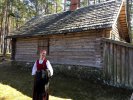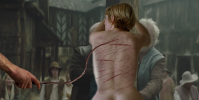windar
Teller of Tales
This story is based on a historical scenario posed to me by one of our newer members @Birc4fem. He is Latvian and has researched the history of his country. One time, he was talking to an elderly woman about life in older times and she happened to mention that her grandmother, when she was a young woman around the turn of the 20th Century, had been birched naked at the whipping post for playing hooky from work in the fields to have sex with her lover. This story is based on that incident, though the names have been changed to protect the innocent guilty.
PROLOGUE:
Many years ago, in a forest near the Baltic, a small acorn fell to the ground, detached from its parental oak tree by a brief puff of wind. It found fertile soil. Luckily, no squirrels or mice ate it.
It put down roots to draw water and minerals from the earth. It pushed up a stem with leaves, finding a few shafts of sunlight that penetrated through the canopy of the mature forest. Soon, it was as tall as a person.
In a few years, it had taken its place as a full-fledged member of the forest. Its trunk grew wide and straight, unbending in the strongest storms.
The forest and all the farmlands around it belonged to a very rich and powerful man, the Baron Friederick von Kaltenbach. His ancestors had come east from Prussia a few centuries ago and claimed the land. He could sense that perhaps the winds were changing, that the times might come when one man could no longer exercise absolute control over a large piece of land and the people that lived on it.
But for now, the Baron was the ruler of his little fiefdom and he would do everything in his power to keep that situation in place for as long as he could.
One day he called his estate Manager, a local man, large and mean, into his very plushly decorated office. “Juris,” he said, “These Latvian peasants are lazy. They would rather get drunk and fuck than work on my land. We need some discipline here.” He spoke in German, having barely bothered to learn more than a few words of the local language.
“Yes, Herr Baron,” the Manager said. “I am ashamed for how they behave.” He was a Latvian himself, of course, but he knew who paid his salary.
“I want you to take some men and go into the forest and find the strongest oak tree that you can. Cut it down and make a sturdy whipping post. I want it erected in the center of the village so that everyone can see it and know that I mean business.”
“Yes, Herr Baron. I am glad you are doing this. I will be pleased to whip these worthless miscreants. Man or woman, they will have no mercy from me!”
Juris took a party of a few men with saws and axes into the forest. They surveyed the trees, looking for just the right one. Their eyes lit on our tree. “That one!” Juris exclaimed. In less than an hour, they toppled the work of almost two decades of growth and struggle to the forest floor. The rest of the day was spent sawing the tree into pieces that could be loaded onto a cart drawn by two strong horses.
The next day, the work crew dug a hole in the bare dirt in the center of the village, in front of the Church and the tavern and the few shops that the poor peasants could afford to buy their basic staples at. They selected a long thick section of wood from the strongest part of the tree and buried one end in the ground, packing the space with rocks and then filling in the earth and tamping it down.
Juris tested the post by leaning all of his considerable weight into it and pushing hard. It did not move.
“Good!” he exclaimed. The rest of the wood was taken to a lumberyard in the nearby town where it was sold to be used to build houses. So, the Baron got his whipping post to discipline the peasants and made a profit on the deal.
And so the post stood. It was rough and unfinished, so that when those being punished-by the whip on their back if they were men, or the birch on their buttocks if they were women- pressed their naked bodies into it to escape the terrible pain of their well-deserved lashes, it scratched the skin of their chests, adding to their agony.
And because it was rough, it was able to absorb the many things that came off the poor souls who had been punished there-their blood, sweat and tears-so that when one was tied to it, one was in essence sharing one’s body with those who had been tied there before.
One day, the post had the pleasure of making the acquaintance of a young woman named Agnese, who happened to be born on the day that the acorn fell to the ground. This is her story….
PROLOGUE:
Many years ago, in a forest near the Baltic, a small acorn fell to the ground, detached from its parental oak tree by a brief puff of wind. It found fertile soil. Luckily, no squirrels or mice ate it.
It put down roots to draw water and minerals from the earth. It pushed up a stem with leaves, finding a few shafts of sunlight that penetrated through the canopy of the mature forest. Soon, it was as tall as a person.
In a few years, it had taken its place as a full-fledged member of the forest. Its trunk grew wide and straight, unbending in the strongest storms.
The forest and all the farmlands around it belonged to a very rich and powerful man, the Baron Friederick von Kaltenbach. His ancestors had come east from Prussia a few centuries ago and claimed the land. He could sense that perhaps the winds were changing, that the times might come when one man could no longer exercise absolute control over a large piece of land and the people that lived on it.
But for now, the Baron was the ruler of his little fiefdom and he would do everything in his power to keep that situation in place for as long as he could.
One day he called his estate Manager, a local man, large and mean, into his very plushly decorated office. “Juris,” he said, “These Latvian peasants are lazy. They would rather get drunk and fuck than work on my land. We need some discipline here.” He spoke in German, having barely bothered to learn more than a few words of the local language.
“Yes, Herr Baron,” the Manager said. “I am ashamed for how they behave.” He was a Latvian himself, of course, but he knew who paid his salary.
“I want you to take some men and go into the forest and find the strongest oak tree that you can. Cut it down and make a sturdy whipping post. I want it erected in the center of the village so that everyone can see it and know that I mean business.”
“Yes, Herr Baron. I am glad you are doing this. I will be pleased to whip these worthless miscreants. Man or woman, they will have no mercy from me!”
Juris took a party of a few men with saws and axes into the forest. They surveyed the trees, looking for just the right one. Their eyes lit on our tree. “That one!” Juris exclaimed. In less than an hour, they toppled the work of almost two decades of growth and struggle to the forest floor. The rest of the day was spent sawing the tree into pieces that could be loaded onto a cart drawn by two strong horses.
The next day, the work crew dug a hole in the bare dirt in the center of the village, in front of the Church and the tavern and the few shops that the poor peasants could afford to buy their basic staples at. They selected a long thick section of wood from the strongest part of the tree and buried one end in the ground, packing the space with rocks and then filling in the earth and tamping it down.
Juris tested the post by leaning all of his considerable weight into it and pushing hard. It did not move.
“Good!” he exclaimed. The rest of the wood was taken to a lumberyard in the nearby town where it was sold to be used to build houses. So, the Baron got his whipping post to discipline the peasants and made a profit on the deal.
And so the post stood. It was rough and unfinished, so that when those being punished-by the whip on their back if they were men, or the birch on their buttocks if they were women- pressed their naked bodies into it to escape the terrible pain of their well-deserved lashes, it scratched the skin of their chests, adding to their agony.
And because it was rough, it was able to absorb the many things that came off the poor souls who had been punished there-their blood, sweat and tears-so that when one was tied to it, one was in essence sharing one’s body with those who had been tied there before.
One day, the post had the pleasure of making the acquaintance of a young woman named Agnese, who happened to be born on the day that the acorn fell to the ground. This is her story….






















